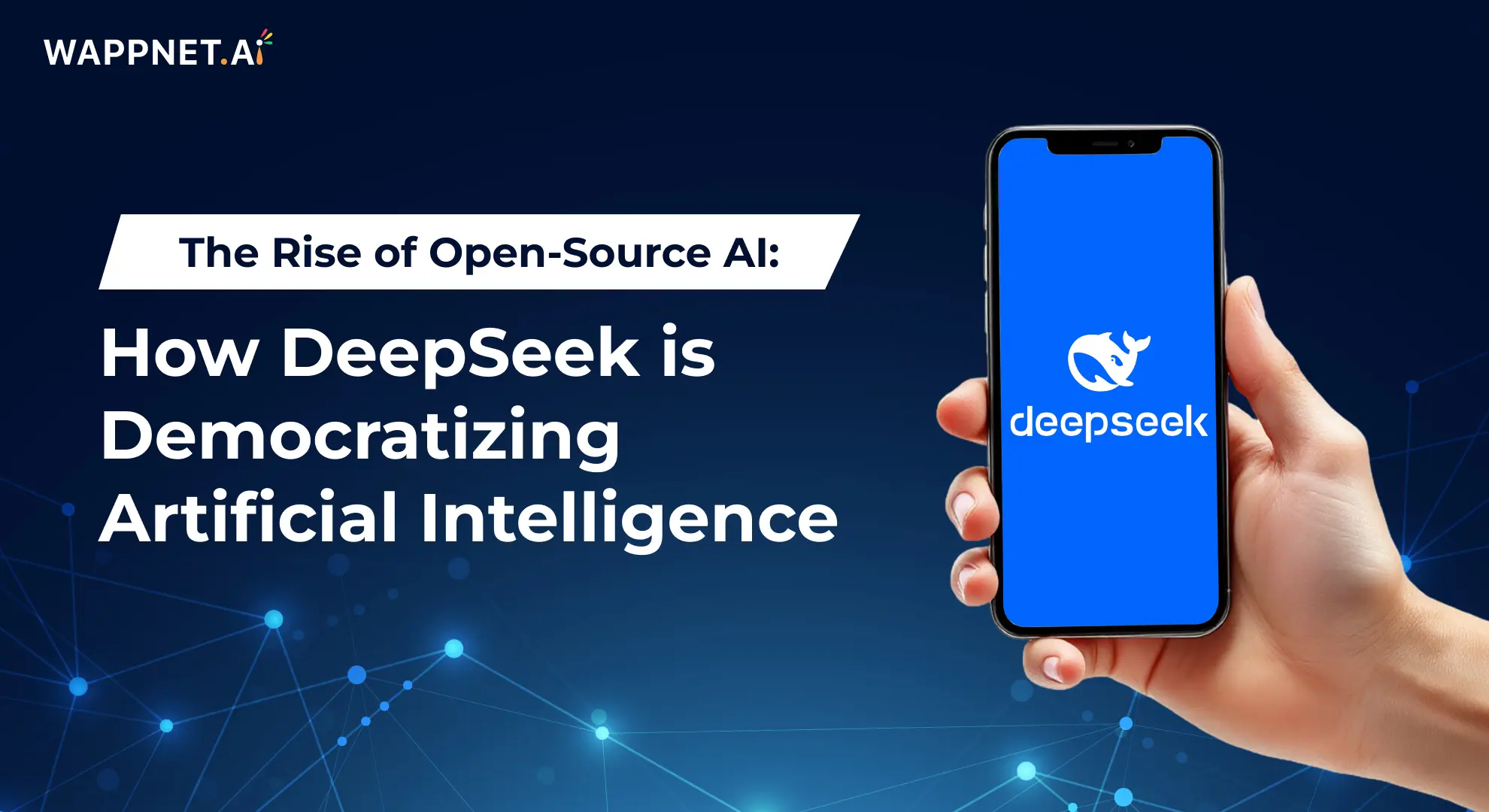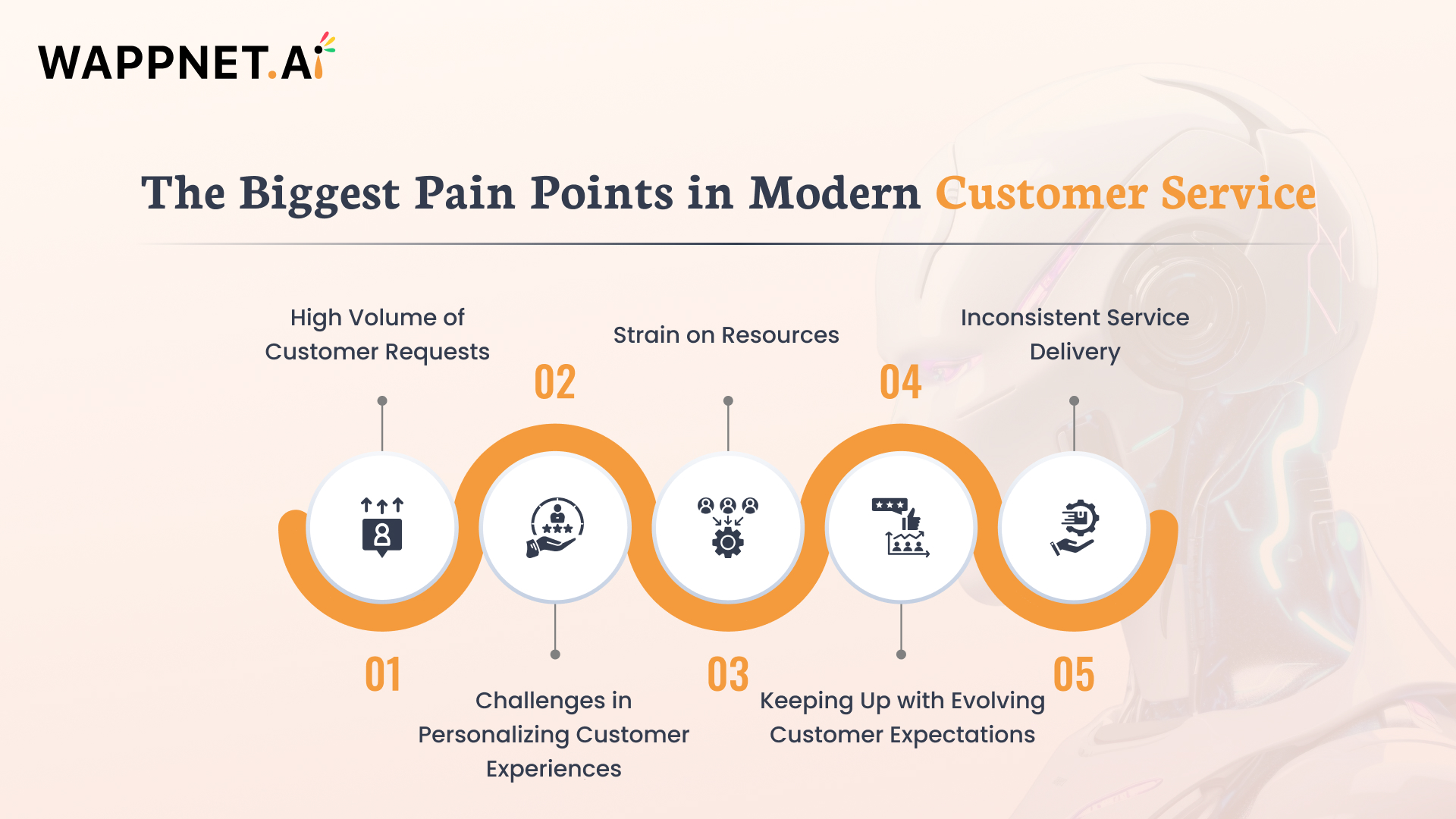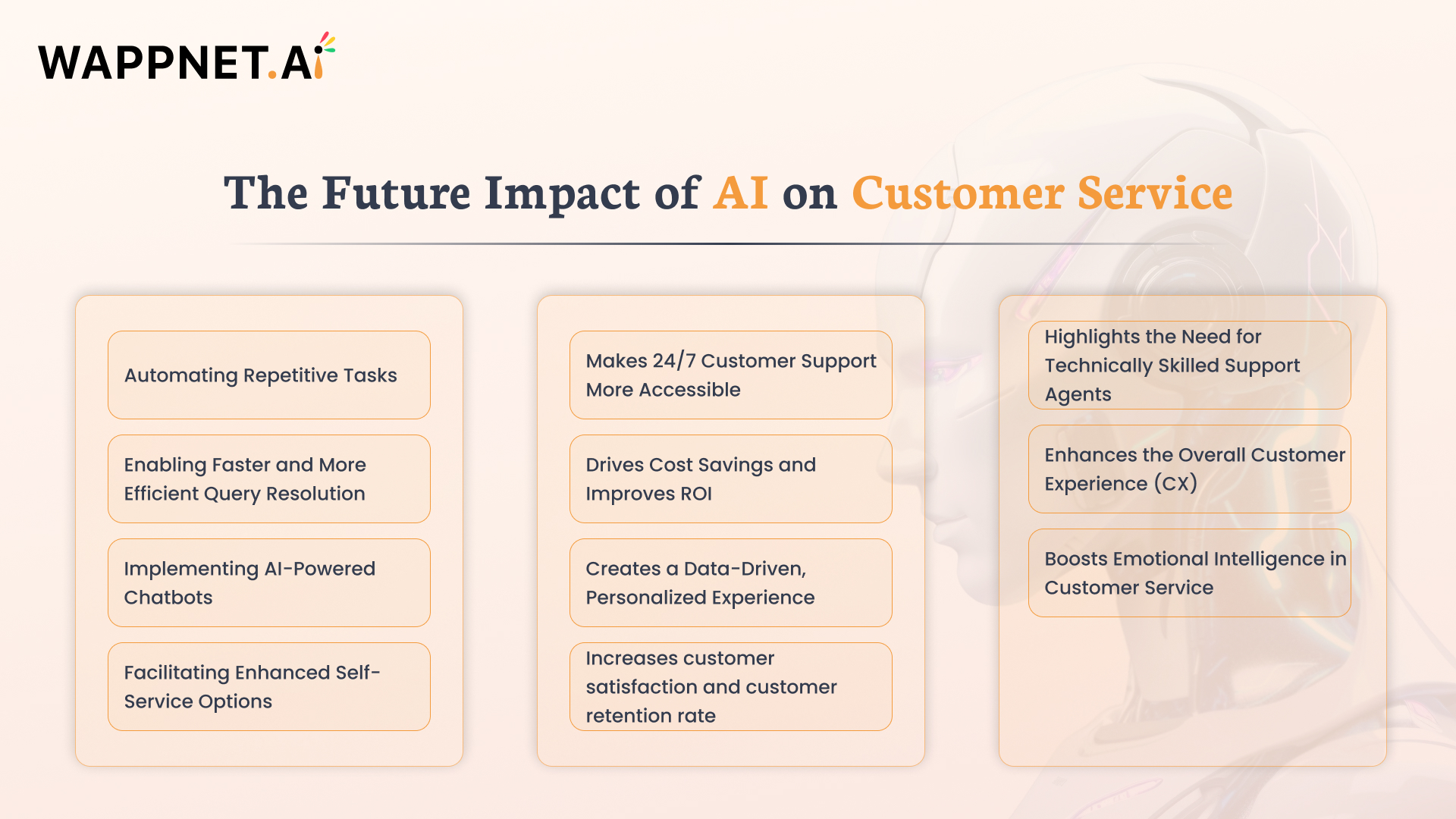Managing a business includes receiving more and more customer requests, solving them in time, and giving a personal touch to emphasize your brand among others. The result? Greater customer satisfaction and enhanced loyalty.
The only way to respond to these rising challenges is to drastically change the technology- a move that is already happening. Artificial Intelligence (AI) has come to change the customer service industry. Here, we will take a glimpse at the future of AI in customer service and see what AI can do to help bring your customer service to another level.
Key takeaway:
- The use of AI in customer service is automating repetitive work, making support possible 24/7, and expanding personalization to larger numbers of people.
- Sometimes, a large number of requests, impersonal experience, and dissimilarity in experience are associated with high-volume issues and challenges that businesses are struggling with nowadays. AI is the way to solve the problems.
- Predictive analytics, self-service tools, and AI-powered chatbots lead to lower response times and surpass the satisfaction levels of customers
- Companies that employ AI observe significant changes, such as the increased efficiency by up to 40 percent and lowered operations expenses by 30 percent (McKinsey).
- Such human agents can serve complex and high-empathy interactions due to AI, as it helps them handle routine inquiries, thereby improving the quality of service.
- Whether an organization wants it or not, adopting AI in customer service is a feature, rather than a choice, in remaining competitive, achieving higher ROI, and providing personal and emotional intelligence in customer experiences.
Table of Contents
- The Biggest Pain Points in Modern Customer Service
- High Volume of Customer Requests
- Challenges in Personalizing Customer Experiences
- Strain on Resources
- Inconsistent Service Delivery
- Keeping Up with Evolving Customer Expectations
- The Future Impact of AI on Customer Service
- 1. Automating Repetitive Tasks
- 2. Enabling Faster and More Efficient Query Resolution
- 3. Implementing AI-Powered Chatbots
- 4. Facilitating Enhanced Self-Service Options
- 5. Makes 24/7 Customer Support More Accessible
- 6. Drives Cost Savings and Improves ROI
- 7. Creates a Data-Driven, Personalized Experience
- 8. Increases customer satisfaction and customer retention rate
- 9. Highlights the Need for Technically Skilled Support Agents
- 10. Enhances the Overall Customer Experience (CX)
- 11. Boosts Emotional Intelligence in Customer Service
- The Future of Customer Service Powered by AI
The Biggest Pain Points in Modern Customer Service
Customer service is one of the industries that has various challenges that might hinder any business from achieving its objectives in regard to customer service. Some of the major issues that they commonly face are as follows:
High Volume of Customer Requests
A high volume of support requests can quickly overwhelm your customer service team.. Inboxes become filled, phones remain congested, and the social media platforms become busy all the time. That usually results in subpar response times, a longer resolution of issues, and dissatisfied consumers. When the team is overwhelmed, even vital requirements can fall through the cracks, and, eventually, it will cost you the service quality and the brand image.
Challenges in Personalizing Customer Experiences
There is no more a need to order fast solutions by the customers; people desire to get experiences unique to them. In fact, 71 percent of the customers are of the opinion that companies are supposed to change the manner in which they communicate with their customers in accordance with their individual needs. As the customer base is increasing continuously, it becomes rather challenging to offer a personalized service regularly.
It needs specific information, such as purchase history, preferences, and behavior, that cannot be arranged manually very efficiently. Personalizing each interaction is both cumbersome and demanding in terms of resources, even to the most accomplished customer service heads. As a result, many teams fall back on generic responses—something today’s customers find impersonal and unsatisfying.
Strain on Resources
A recurring customer question causes a waste of valuable human resources in handling trivial cases when the resource is supposed to be involved in value-adding activity. Because of this, other more complicated topics that need specialized care are usually put on hold or neglected. Such an imbalance is taxing on your staff, it limits them to whatever is legitimate, and it may injure your clients’ encounter and perception of you too.
Inconsistent Service Delivery
Achieving consistent service straight through various channels and among the staff is not a very easy task. Whether it’s email, phone, or live chat, inconsistencies in tone, response quality, or approach can lead to a fragmented customer experience.
This disparity is what can easily cause a breakdown of credibility as well as satisfaction, and this is why the relevance of having a consistent and consistent way of service delivery can scarcely be overemphasized.
Keeping Up with Evolving Customer Expectations
With technology making new advances and with the major brands upping the ante, customer demands are becoming greater than ever before. The customers of today want efficient, flawless, and personalized service across every interaction point. Businesses need to be dynamic, flexible, and innovative so that it can satisfy soaring demands. Losing can translate to loss of competitive advantage, and it never stops.
The Future Impact of AI on Customer Service
AI customer service will revolutionize how companies can interact with their customers, and they will become more personified, quicker, and human-like.
It will deal with menial work, customer satisfaction, and alleviate the workloads of support teams.
1. Automating Repetitive Tasks
According to Forbes, AI is projected to emerge with a sky-high growth rate of 37.35% per year in 2023 and over its forthcoming decade. AI in customer service is so instrumental in customer service as it is an ideal solution to replace tedious, monotonous work done by customer support personnel and allow their further attention to more complicated matters that indeed require human contact. This not only streamlines operations but also leads to more meaningful and effective customer interactions.
What this implies is that, once the AI can attend to all the automated customer requests, you and your staff can connect with customers and offer more personal and respectful customer assistance. It is not merely an increase in global efficiency, but also a rise in the quality of service, as human agents may interfere in those points where a display of empathy and more in-depth understanding seems to be the most necessary.
2. Enabling Faster and More Efficient Query Resolution
With the help of AI-driven solutions, it becomes possible to analyze a large amount of information and customer signals in a short period of time, which enables them to learn requests in a fraction of a second and respond to them with the help of all the essential context.
Through the ability of technologies such as natural language processing (NLP), machine learning, these tools may determine intent, retrieve useful information, and give accurate responses in real-time. The result is reduced response rates, increased customer satisfaction, and a reputation for reliability and efficient service.
3. Implementing AI-Powered Chatbots
AI chatbots take advantage of natural language processing (NLP) to conduct a natural and contextually personal conversation-like interaction with a real person. As the world market of chatbots is expected to surpass 1.34 billion in 2025, it is obvious that such smart helpers are going to play a significant part in the customer service innovation of the next level.
The chatbot revolution has led many AI-based CRM systems to adopt advanced technologies such as GPT-powered chatbots. An outstanding instance of such a chatbot is the Turing chatbot created by wappnet.ai, which automates the answers to frequent questions of customers and saves the time and efforts of support teams.
However, Turing also does more than simple automation; it will access knowledge bases to provide accurate responses, and in a case where a request requires human involvement, it will automatically create a support ticket and forward it to the appropriate agent. This intelligent integration simplifies the whole customer support cycle and also makes sure that the customers receive the necessary support.
4. Facilitating Enhanced Self-Service Options
AI is also making self-service smarter and more intuitive for users. Artificial intelligence-based knowledge bases and interactive tools enable customers to find an answer themselves and solve their problems in a couple of clicks. These systems leverage predictive analytics and individual recommendations and show the nearest answer to the users to minimize contacting the support.
Not only does this enable customers to be in charge of their experience, it also relieves pressure on your support team and enables them to consider more complicated issues.
5. Makes 24/7 Customer Support More Accessible
The customer support requirements are not very 9-to-5-ish because the questions may be raised at any time, anywhere. Using AI-based technology, it is possible to provide round-the-clock support, which is a great option to provide customers with assistance in time regardless of the time of day.
Equipped with automated solutions like chatbots with artificial intelligence, the business can get easy responses to their questions and solve their problems, unlike during working hours. The aforementioned extent of availability not only enhances customer satisfaction but also enhances the reputation of your brand as being reliable, responsive, and easily available.
6. Drives Cost Savings and Improves ROI
AI not only enhances the customer experience, but it also saves a lot of costs. Automation of recurring processes and optimization of support structures help businesses save costs on operations and work at a more productive rate.
According to a recent McKinsey survey, 40 percent of business efficiency and a 30 percent decrease in overall operational costs are possible to achieve through AI. Allowing an improvement in workflows, resource placement, and output, AI can spur the highly acknowledged rise in the return on investment.
7. Creates a Data-Driven, Personalized Experience
AI can transform customer data into highly personalized, context-rich experiences. It assists companies in providing personalized facilitation and suggestions that resonate with their relevance by using user behavior, preferences, and purchase history.
According to a report published by Twilio Segment, 69 percent of consumers feel good about personalization, particularly when individual data, not collective third-party data, is used.
By applying such data-driven personalization, you can engage the customers in a personal manner and reinforce the relationships, creating long-term loyalty and trust.
8. Increases customer satisfaction and customer retention rate
AI can make customer data genuinely individual. It enables businesses to serve personalized recommendations and assistance that seem very relevant to the customers based on users’ behavior, preference, and habits.
One report produced by Twilio Segment revealed that 69 percent of consumers like personalization, particularly when it is done with information that has been provided by an individual at their discretion, as opposed to that derived through third-party sources.
By employing this type of data-driven customization, you are better able to target the customer in a personal capacity, leading to the establishment of further trusting relationships.
Read More: How to Create an AI Agent: Your Complete Step-by-Step Guide
9. Highlights the Need for Technically Skilled Support Agents
Technological development keeps advancing, and with it, the job of these human support agents grows. Since AI undertakes most of the mundane and mechanical work, the agents now have ample time to attend to specialized and complicated issues of customers.
This change implies that support teams should be more technically competent ones capable of solving complex issues, thinking rather than behaving critically, and providing highly qualified support. Agents should not worry about AI-based job replacement; rather, they are supposed to work on upskilling and learn to work with such technologies to remain valuable and future-proof.
10. Enhances the Overall Customer Experience (CX)
Customer service using AI will change how customers get supported. By responding faster, giving individual attention, and being always open, AI can increase the level of what excellent customer service can be. AI also helps play a large part in fixing more pleasant, less bumpy experiences by collaborating with support teams and ensuring they keep coming back.
11. Boosts Emotional Intelligence in Customer Service
At this point, AI is increasingly able to read and understand human emotion. The development of the reasoning of sentiment and emotional intelligence allows the AI to interpret intonations and words, as well as emotive indicators, in order to establish how a certain person is feeling.
This allows AI to react more like a human being who is more considerate and emotional. With the AI of this kind used by technological companies, they will be capable of forming better connections with their clients, have the issues defined by the latter resolved faster and easier, and have a more humanized and satisfying experience of having an interaction.
The Future of Customer Service Powered by AI
There is no doubt that the future of customer service is intertwined with AI. The businesses need to adopt AI-driven customer services in order to facilitate the provision of superior experiences and enhanced customer loyalty. It is predicted that by 2025, almost 95% of customer interactions will be automated with the help of AI, which makes it one of the notable facilitators of efficiency and personalization.
The idea of great customer service is an unfinished process based on innovations, new expectations, and a great willingness to pay attention to the customers in the first place. Technology continues to change, and AI is a useful tool to provide solutions to the current problems, create a better interaction, and raise the level of assistance in general.
Related Post

AI Implementation Strategy for CEOs & CTOs in 2026: From Pilot to Scalable Systems
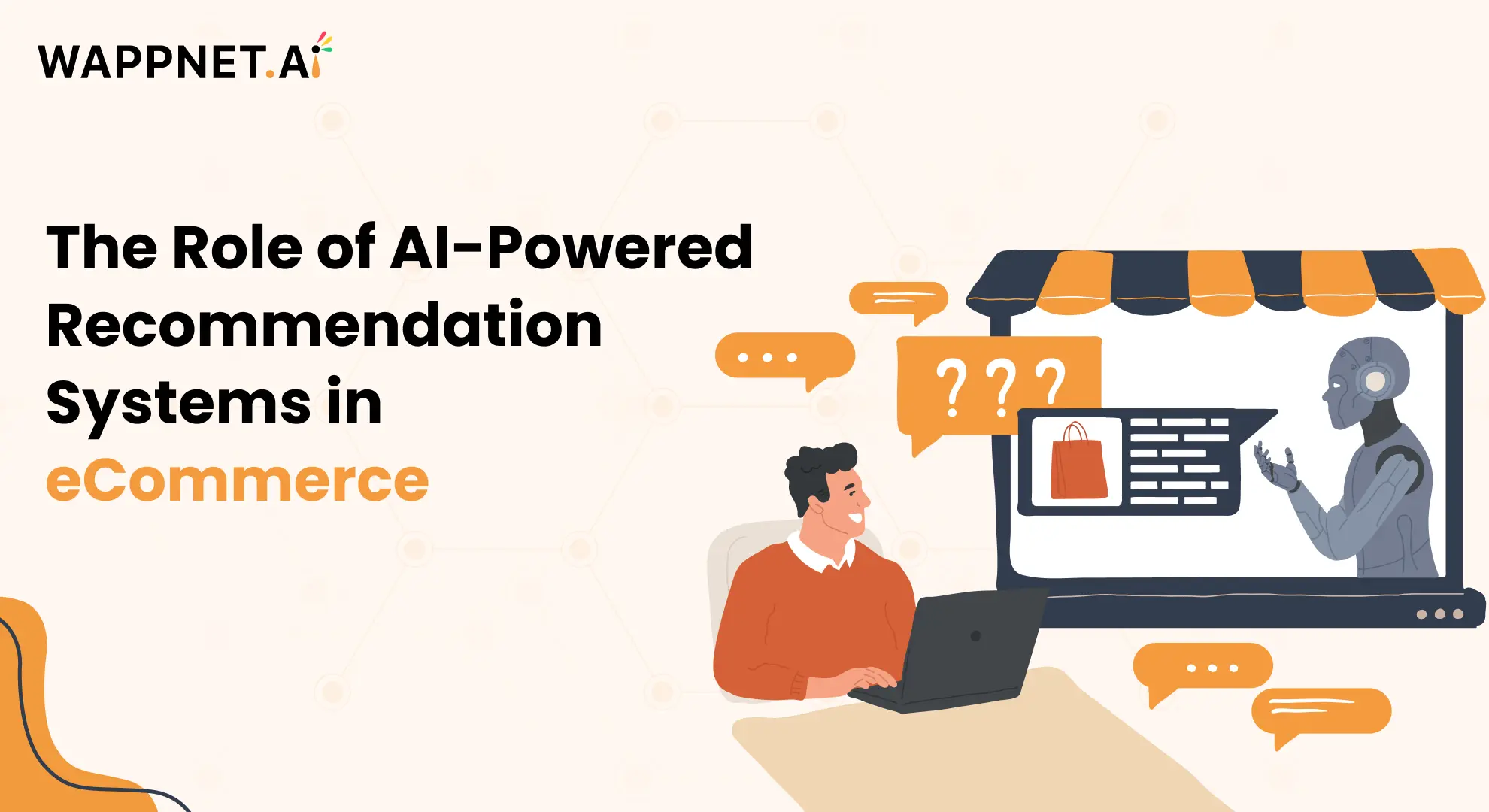
The Role of AI-Powered Recommendation Systems in E-Commerce
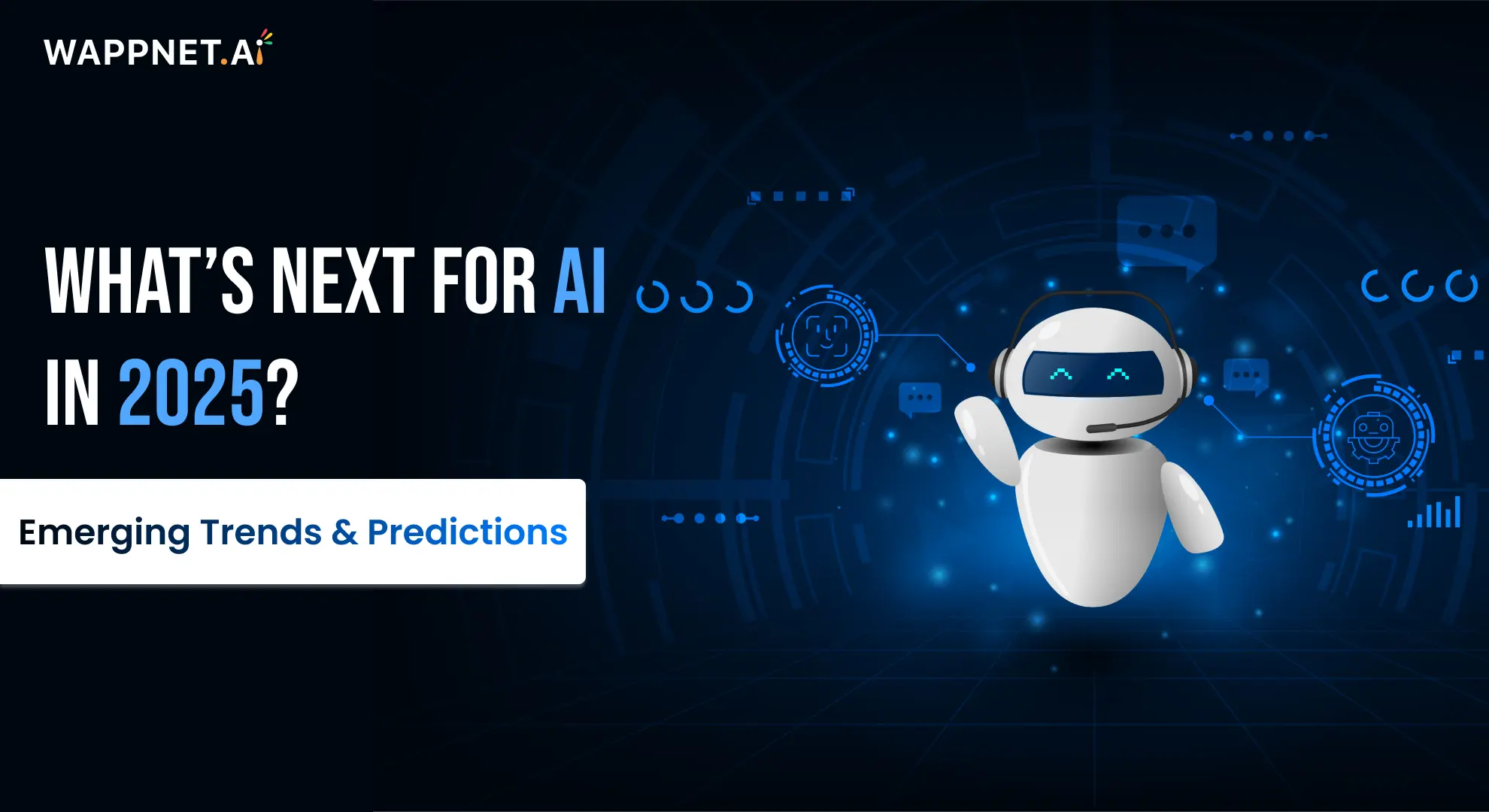
What’s Next for AI in 2025? Emerging Trends & Predictions
